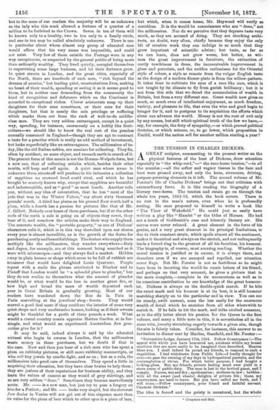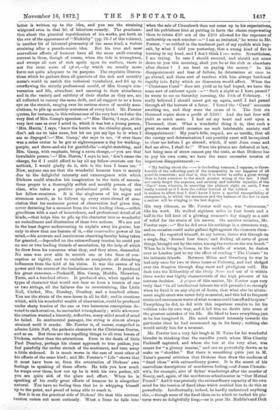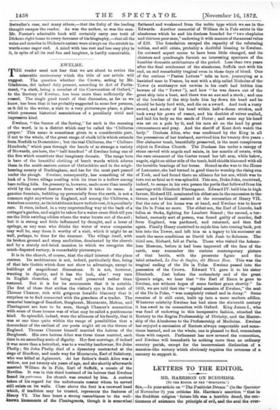THE TENSION IN CHARLES DICKENS.
AGREAT sculptor, commenting to the present writer on the physical features of the bust of Dickens, drew attention especially to "the whip-cord,"—" the race-horse tension,"—in all the muscles ; —all the softer and vaguer tissues in the face and
bust were pruned away, and only the keen, strenuous, driving, purpose-pursuing elements in it left. The second, volume of Mr. Forster's life of Charles Dickens* brings out that criticism with extraordinary force. It is like reading the biography of a literary race-horse. The tension and strain go on through the whole ten years, 1812-52, which the book covers. There is no rest in the man's nature, even when he is professedly resting. He once proposed to himself to write a book like "The Vicar of Wakefield." He could just as easily have written a play like " Hamlet " or the Odes of Horace. He had not a touch of Goldsmith's ease and leisurely literary air. His nerves were never relaxed. A great element in the force of his genius, and a very great element in its principal limitations, is due to their constant strain, which spoils almost all the sentiment, makes it theatrical and always on the stretch, and not unfrequently lends a forced ring to the greatest of all his faculties, his humour. The biography is, of course, Most amusing reading. Whether the moral tension is justified or in excess, it is always there, and therefore even if we are annoyed and repelled, our attention never flags. But Mr. Forster is not as fastidious as he might have been in inserting the would-be comic letters of his friend, and perhaps on that very account, he gives a picture that is the more complete,—complete in its unconscious as well as in its conscious contribution to our knowledge of the great humour- ist. Dickens is always on the double-quick march. If he hits the exact mark and his humour is at its best, it is still humour marching sharply on to the particular end in view. You can see its steady, swift current, none the less easily for the enormous wealth of detail which he snatches from all sides wherewith to enrich it. If he fails to hit the mark, and talks excited nonsense, as in the silly letter about his passion for the Queen in the first volume, and many a little note in this, it is nevertheless all in the same vein, jocosity stretching eagerly towards a given aim, though the aim is falsely taken. Consider, for instance, this answer to an invitation to dinner sent by Abase, Stanfield, and Mr. Forster :-
"Devonshire Lodge, January 17th, 1844. Fellow Countrymen !—The appeal with which you have honoured me, awakens within my breast emotions that are more easily to be imagined than described. Heaven bless you. I shall indeed be proud, my friends, to respond to such a requisition. I had withdrawn from Public Life—I fondly thought for ever—to pass the evening of my days in hydropathical pursuits, and the contemplation of virtue. For which latter purpose, I had bought a looking-glass. But, my friends, private feeling must ever yield to a stern sense of public duty. The man is lost in the invited guest, and I comply. Nurses, wet and dry ; apothecaries ; mothers-in-law ; babbies ; with all the sweet (and chaste) delights of private life ; these, my countrymen, are hard to leave. But you have called me- forth, and I will come.--Fellow countrymen, your friend and faithful servant, CHARLES DICKENS."
The idea is forced and the gaiety is unnatural, but the whole
Chapman and Hall. as a sober cretur to be got at eighteenpence a day for working- to clear me before I go abroad ; which, if next June come and people, and three-and-six for gentlefolks '—night-watching, said find me alive, I shall do !" When the pirates are defeated at law, Mrs. Gamp, with emphasis, being a extra charge,—' you are that but being men of straw cannot pay the costs, so that Dickens has inwallable person.'—' Mrs. Harris,' I says to her, don't name the to pay his own costs, we have the same excessive tension of -charge, for if I could afford to lay all my fellow-creeturs out for imperious disappointment :— nothink, I would gladly do it, sich is the love I bears 'em.' " " My feeling about the — is the feeling common, I suppose, to three- Now, anyone can see that the wonderful humour here is mainly fourths of the reflecting part of the community in our happiest of all clue to the delightful intensity and extravagance with which Possible countries; and that is, that it is better to suffer a great wrong Dickens could abandon his imagination to the train of associa- than to have recourse to the much greater wrong of the law. I shall tions proper to a thoroughly selfish and mouldy person of this Carol coos, wherein, in asserting the plainest right on earth, I was class, who takes a positive professional pride in laying out really treated as if I wore the robber instead of the robbed It her fellow-creatures. It is the singleness of his eager and is useless to affect that I don't know I have a morbid susceptibility of exasperation, to which the meanness and the badness of the law in such strenuous search, as he follows up every cross-thread of am- a matter will be stinging to the last degree."
-elation that his enormous power of observation had given him,
His very idleness, as Mr. Forster well says, was "strenuous," never deviating for a moment from the two leading ideas,—selfish
eighteen miles in four hours and a greediness with a cant of benevolence, and professional detail of all like his work. He walked
kinds,—that helps him to pile up the character into so wonderful half in the full heat of a glowing summer's day simply as a sort an embodiment and illustration of these two notions. We are not of relief for the straiu of his nerves. On another occasion, Mr. in the least degree endeavouring to explain away his genius, but Forster says :—" But he did even his nothings in a strenuous way, -only to show that one feature of it,—the constructive power of his and on occasion could make gallant fight against the elements them- enind,—his accurate and omnivorous observing faculty being taken selves. He reported himself, to my horror, thrice wet through on for granted,—depended on the extraordinary tension he could put a single day, 'dressed four times,' and Sliding all sorts of great ion one or two leading threads of association, by the help of which things, brought out by the rains, among the rocks on the sea-beach." he drew from his resources what they, and they alone, demanded. When he is living in Genoa, in the middle of winter, he dashes No man was ever able to stretch one or two lines of con- over to London just to try the effect of reading "The Chimes" to ception so tightly, and to exclude so completely all disturbing his intimate friends. Between Milan and Strasburg he was in influences from the field of his vision. It was the source of his bed only once for two or three hours at Fribourg, and had sledged power and the source of the limitations on his power. It produced over the Simplon through deep snow and prodigious cold. His his great successes,—Peckaniff, Mrs. Gamp, Meddle, Micawber, dash into the Editorship of the Daily News and out of it within Toots, and a hundred others. It produced also, when applied to three weeks was highly characteristic of the high pressure of his types of character that would not bear so keen a tension of one nervous decision. A propos of this matter, Mr. Forster says very or two strings, all the failures due to overstraining, like Little truly that "in all intellectual labours his will prevailol so strongly Nell, Carker, Mrs. Dombey, Dombey, and a hundred others. when he fixed it on any object of desire, that what else its attain- You see the strain of the race-horse in all he did ; and in creations ment might exact was never duly measured, and this led to frequent which, with his wonderful wealth of observation, could be produced strain and uncommon waste of what no man could less afford to spare."
Everything he did, he did with this imperious resolve to let his milder sharp tension of the one or two humorous conceptions de- voted to each creation, he succeeded triumphantly ; while wherever to of mind the creation wanted a leisurely, reflective, many-sided mood the greatest mistakes of his life. He liked to have everything just he failed. In sentimental passages, the string is almost always is strained until it cracks. Mr. Forster is, of course, compelled to -admire Little Nell, the pathetic elements in the Christmas Stories, would satisfy him for a moment.
and so on. But them are the repelling things to all true lovers of Mr. Forster has a very fair laugh at M. Taine for his wonderful Dickens, rather than the attractions. Even in the death of little blunder in thinking that the maudlin youth whom Miss Charity Paul Dombey, perhaps his closest approach to true pathos, you Pecksniff captured, and whom she lost at the very altar, was feel painfully the undue stretch of the sentiment, and turn away meant for "a gloomy maniac," and one so powerfully drawn as to a little sickened. It is much worse in the case of most other of make us "shudder." But there is something quite just in M. his efforts of the same kind ; and Mr. Forster'e "Life" shows that Taine's general criticism that Dickens does draw the madness of it must have been so, from the ostentation of Dickens' own "fixed ideas" with extraordinary power. It is the secret of his feelings in speaking of these efforts. He tells you how much marvellous descriptions of murderous feeling,—of Jonas Chuzzle- he weeps over them, how cut up he is with his own pathos, till wit's, for example, also of Sykes' wanderings after the murder of you are quite sick of the glare and effort. When he is Nancy, and, again, of the murderous schoolmaster in "Our Mutual speaking of his really great efforts of humour he is altogether Friend." And it was precisely the extraordinary capacity of his own naturaL You have no feeling then that he is whipping himself mind for the tension of fixed ideas which enabled him to do this so
up to the point, and proud of being able to reach it. powerfully. Intellectually, indeed, he hardly understood anything
letter is written up to the idea, and you see the straining when the sale of Chuzzlewit does not come up to his expectations, whipcord even in that bit of laborious comedy. The proclama- and his publishers hint at putting in force the clause empowering tion about the piratical republication of his works, put forth on them to retain £50 out of the /200 allowed for the expenses of the eve of the appearance of "Nickleby" (pp. 76-7 of this volume), authorship on each number :•••.44 I am so irritated," he wrote to Mr. is another bit of laboured pleasantry of the same kind, a violent Forster, " so rubbed in the tenderest part of my eyelids with bay- 'straining after a pseudo-comic idea. But his true and most salt, by what I told you yesterday, that a wrong kind of fire is marvellous efforts of humour have all the same swift-running burning in my head, and I don't think I can write. Nevertheless, -current in them, though of course, when the tide is triumphant, I am trying. In case I should succeed, and should not come and sweeps all sort of rich spoils upon its surface, -there is down to you this morning, shall you be at the club or elsewhere not the same sense of efrort,—by which we usually mean after dinner ? I am bent on paying the money." In his force not quite adequate to its purpose. The exquisite illustra- disappointment and fear of failure, he determines at once to lions which he gathers from all quarters of the sick and monthly go abroad, and these sort of resolves with him always hardened nurse's world to enrich the technical vocabulary, and fill up to rapidly into fixity which no dissuasion would affect. When the -overflowing the strictly professional mould, of Mrs. G-amp's con- " Christmas Carol " does not yield as he had hoped, we have the versation and life, abundant and amazing in their abundance same sort of outburst again :—" ' Such a night as I have passed l' and in the variety and subtlety of their shades as they are, are he wrote to me on Saturday morning, the 10th of February. ' I all collected to convey the same drift, and all suggest to us a keen really believed I should never get up again, until I had passed -eye on the stretch, ranging over its various stores of mouldy asso- through all the horrors of a fever. I found the Carol ' accounts ciations, to pile up monthly-nurseisms of every kind. Mr. Forster awaiting me, and they were the cause of it. The first six quotes, for instance, in this volume one of the very best and also the thousand copies show a profit of 1230 ! And the last four will very first of Mrs. Gamp's speeches:—" 'Mrs. Harris,' I says, at the yield as much more. I had set my heart and soul upon a very last case as ever I acted in, which it was but a young person, Thousand, clear. What a wonderful thing it is, that such a 'Mrs. Harris,' I says, leave the bottle on the chimley-piece, and great success should occasion me such intolerable anxiety and don't ask me to take none, but let me put my lips to it when I disappointment ! My year's bills, unpaid, are so terrific, that all am so dispoged.'—' Mrs. Gamp,' she says to me, ' if ever there the energy and determination I can possibly exert will be required as a sober cretur to be got at eighteenpence a day for working- to clear me before I go abroad ; which, if next June come and people, and three-and-six for gentlefolks '—night-watching, said find me alive, I shall do !" When the pirates are defeated at law, Mrs. Gamp, with emphasis, being a extra charge,—' you are that but being men of straw cannot pay the costs, so that Dickens has inwallable person.'—' Mrs. Harris,' I says to her, don't name the to pay his own costs, we have the same excessive tension of -charge, for if I could afford to lay all my fellow-creeturs out for imperious disappointment :— nothink, I would gladly do it, sich is the love I bears 'em.' " " My feeling about the — is the feeling common, I suppose, to three- Now, anyone can see that the wonderful humour here is mainly fourths of the reflecting part of the community in our happiest of all clue to the delightful intensity and extravagance with which Possible countries; and that is, that it is better to suffer a great wrong Dickens could abandon his imagination to the train of associa- than to have recourse to the much greater wrong of the law. I shall not easily forget the expense, and anxiety, and horrible injustice of the tions proper to a thoroughly selfish and mouldy person of this Carol coos, wherein, in asserting the plainest right on earth, I was class, who takes a positive professional pride in laying out really treated as if I wore the robber instead of the robbed It her fellow-creatures. It is the singleness of his eager and is useless to affect that I don't know I have a morbid susceptibility of exasperation, to which the meanness and the badness of the law in such strenuous search, as he follows up every cross-thread of am- a matter will be stinging to the last degree."
His very idleness, as Mr. Forster well says, was "strenuous," never deviating for a moment from the two leading ideas,—selfish
eighteen miles in four hours and a greediness with a cant of benevolence, and professional detail of all like his work. He walked h volition take its own way, and it led him no doubt in some of as he has imagined it. H mind strained intensely towards the particular ideal he had summoned up in his fancy; nothing else Swivellees case, and many others,—that the fixity of the leading thought escapes the reader. As was the author, so was the man. Mr. Forster's admirable book will certainly carry one trait of Dickens right home to every devourer of his biography,—that all the veins and muscles in Dickens's nature were always on the stretch to- wards some eager end. A mind with less rest and less easy play in it, in spite of all its real fun and laughter, is hardly conceivable.




































 Previous page
Previous page